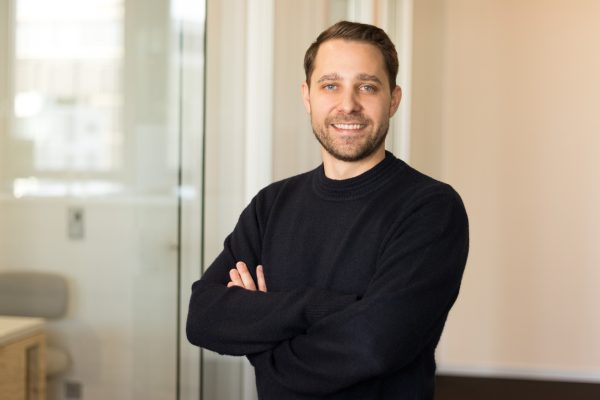Munich Startup: When we spoke last time, you said that Climedo wants to give doctors more time for patients through a meaningful interplay between artificial and human intelligence. Have you been able to achieve this goal?
Sascha Ritz, Co-Founder and CEO of Climedo: Definitely. We are now offering the first interfaces to AI on the Climedo platform. Our solution focuses on patient stratification (editor’s note: estimating the risk that an existing progressive disease could lead to complications or death), subgroup analysis and real-time reporting through GenAI, i.e. generative intelligence, in ongoing studies. Our goal is to enable personalized and effective therapies through a precise understanding of patients’ needs.
This patient-centered approach has been increasingly facilitated by our platform. We place great importance on end-user feedback and conduct regular interviews, focus groups and surveys with doctors, patients and key opinion leaders. Such an iterative process optimizes our feature development and ensures high usability and appealing design.
The results speak for themselves: we have achieved above-average patient retention and data completeness in studies.
Data treasure versus data protection
Munich Startup: What obstacles have you encountered along the way?
Sascha Ritz: On the one hand, the issue of data treasure versus data protection: according to Health Minister Lauterbach, 80 percent of people with statutory health insurance should have an electronic patient file (ePA) by 2025. This will enable the digital provision of important health data, which would also enrich clinical studies. According to a survey conducted by Climedo, patients are open to the idea: 50 percent would like to use the ePA in studies. The expansion of a data pool and “Real-World Evidence” (RWE) play an important role here. RWE demonstrates the effectiveness of drugs in patients in the real world, supports medical decisions and supplements research results. Ideally, this wealth of data is also fed back to patients. With the ePA and the support of AI, risks and side effects can also be identified much earlier.
Lauterbach’s strategy also advocates the availability and linkability of data from various sources. While many industries have long been fully digitized, the healthcare sector in Germany is lagging far behind. This is also reflected in clinical research, which is crucial for medical innovation. The impact on study results is serious. In my view, data protection and data treasure should not run counter to each other but should be intertwined.
In addition, although the pharmaceutical industry is watching innovations such as AI with great interest and we are receiving an increasing number of customer inquiries, actual investments are often a long time coming.
Increasing demand for real-time insights
Munich Startup: How has your solution evolved?
Sascha Ritz: The demand for real-time insights into ongoing studies is growing rapidly. It is no longer sufficient to receive the first results 18 to 24 months after the end of a trial, as is usually the case. With Climedo’s real-time insights, study physicians can be better involved as they can compare patients directly and anonymously with each other. Patients can also be better informed about trends or where they are on a trajectory. Our “Data to Dialogue” approach, which focuses on transparency and education among doctors and patients, supports market launches of innovative therapies so that the most effective and safest therapies prevail and reach patients faster.
Munich Startup: And how are things looking financially for you?
Sascha Ritz: We were recently profitable, but at the end of 2021 we opted for an external “cash injection” to accelerate product development and marketing. The next financing round is planned for early 2025, ideally also with strategic investors from the industry. In addition to investment, they can also help us to accelerate the marketing of our product.
Climedo: Regional roots provide a strong competitive advantage
Munich Startup: What lessons have you learned as a founding team so far?
Sascha Ritz: Our regional roots (“made in Germany/Europe”) are a strong competitive advantage when approaching European pharmaceutical companies. It therefore makes sense for us to continue to focus on the DACH region and Europe. The end-user orientation we have had from the very beginning is extremely valuable for our paying industrial customers from the pharmaceutical and medical technology sectors. We raised money when we didn’t necessarily need it – we were profitable at the end of 2021. However, no one could have predicted the economic downturn in early/mid 2022. Nevertheless, we seized the opportunity and conducted a seed round.
Munich Startup: What role has the Munich ecosystem played on your journey so far?
Sascha Ritz: Definitely a very important role: we benefit from great networking with other founders and have a wide range of learning opportunities across different industries. The strong presence of pharmaceutical and biotechnology companies in the region is also particularly valuable. Our customers also like to visit us, especially during the Oktoberfest.
One of the next steps: The team should grow
Munich Startup: What milestones are you working towards next?
Sascha Ritz: Our next milestones include the growth of our team and the expansion of our capacities. Internationalization in Europe is also on our agenda in order to expand our sphere of influence and open up new markets. After the next financing round, we are aiming to move towards profitability in order to ensure long-term stability and growth.




